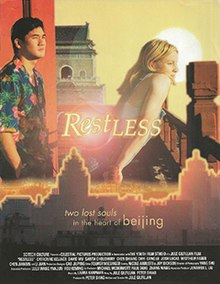Restless (1998 film)
| Restless | |
|---|---|

film poster
|
|
| Directed by | Jule Gilfillan |
| Produced by | |
| Written by |
|
| Starring | |
| Music by | Laura Karpman |
| Cinematography | Yang Shu |
| Edited by | Folmer Wiesinger |
|
Production
company |
|
| Distributed by | Arrow Releasing |
|
Release date
|
|
|
Running time
|
98 minutes |
| Country |
|
| Language | English |
| Budget | $3 million |
Restless is a 1998 romance film directed and co-written by Jule Gilfillan, starring Catherine Kellner, David Wu, Chen Shiang-chyi and Geng Le. An American–Chinese co-production, the film was almost entirely shot and filmed in Beijing and follows two Americans who find love in China.
It was screened at multiple film festivals in 1998 and 1999 before receiving a limited theatrical release in the United States in 2000 and a DVD release on December 4, 2001. Restless was criticized for its clichéd and undelivered storylines, but praised for its scenery.
Leah (Kellner) is a translator who is traveling international cities in search of romance and closure with her estranged boyfriend Jeff. She eventually settles in Beijing, China, where she meets and develops a fixation on Master Sun Zhan (Geng Le), who teaches here a Chinese game called weiqi. When her relationship with Master Sun Zhan takes a turn for the worse, Leah decides to focus on getting revenge on Jeff. Richard (Wu) is a shiftless Chinese-American whose family sends him to Beijing with his grandfather's ashes. Eventually Leah and Richard's paths cross.
Co-produced by Celestial Pictures and Beijing Youth Film Studios, Restless was filmed in Beijing at a cost of $3 million. The dialog was shot primarily in English, with approximately 20% spoken in Chinese. Through the film's title and story, producer and co-writer Peter Shiao wanted to "capture something that's unique to [the college] generation ... the need to go on the road and explore yourself, in the process of exploring the world." While the film highlights the cultural differences between America and China, Shiao notes that he was careful not to overly politicize the dialog, wanting to avoid both being seen as too critical of the Chinese government, and of being too politically correct.
He wanted the film to "test the viability of the Chinese market". Being co-produced with a Chinese company and under a profit-sharing film, Shiao felt the work could be distributed in China without the restrictions placed on other American films. He also felt it would aid diplomacy between the two countries after changes in China's handling of intellectual properties. He notes, however, that Chinese authorities would first have to approve the film, which "push[es] the envelope". It took a year of negotiations over "script approvals, actor selections and crew" for the co-production to be approved, but Shiao felt it was important that the film be viewable to both Chinese and American audiences.
...
Wikipedia
